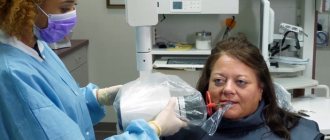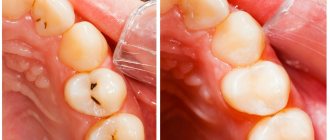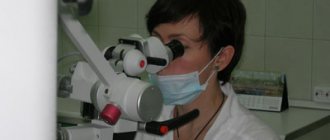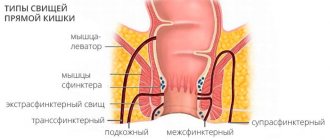What is a Dental Assistant?
A dental assistant is the same person who meets and greets the patient, invites him to enter the office, offers to make himself more comfortable in the chair, and tells him where to put things away.
First of all, of course, he is an assistant to the attending physician. He provides the necessary tools and cooperates with the doctor during the entire work process.
But his role is also to create the most comfortable conditions for the patient. It is thanks to the assistant’s friendly smile, his care and attention that many people lose their fear of the upcoming procedure.
An attentive employee will always notice what the patient needs at the moment - adjust the chair, rinse his mouth.
Before the appointment, the assistant will definitely tidy up the workplace, seat the patient in a chair with all the amenities, adjust the light and prepare the instruments.
You can ask your doctor’s assistant any questions you have about treatment - he will explain everything: from the specifics of concluding a contract for the provision of dental services to a detailed explanation of each step of the operation.
You can get advice from him about caring for your teeth and oral cavity, about different types of fillings, he can recommend toothpaste and a brush - in short, everything related to dental issues and treatment itself, the assistant will tell and explain to the patient in detail.
And if there is a child at a dental appointment, the assistant will do everything to calm and entertain the little patient.
The patient discusses the date of the next appointment with the dentist's assistant - he will call in advance and remind the person about the appointment.
An assistant is a significant figure not only for the doctor, but also for the patient.
Training course for dental assistants on video:
Key Knowledge
The assistant must have basic skills in medicine, as well as be a professional in his field. The young specialist has a secondary medical education (college, technical school, school) with a specialty in nursing.
Periodically, the employee undergoes certification to confirm his knowledge.
This is what the qualification requirements look like in an employment contract for a medical worker of this profile:
| Conditions for tenure | Requirements |
| Education | Specialized secondary |
| Speciality | Nursing |
| Work experience by profession | From 1 year |
| Professional recertification | Once every 6 months |
Since the assistant, in addition to assisting the doctor, also resolves controversial issues with visitors and keeps a journal, his knowledge is not limited to narrow-profile ones.
Here is a complete list of what the assistant should know:
- laws regulating the activities of healthcare institutions and other norms and acts relating to order in this area;
- labor Code;
- how to organize medical dental care at a basic level;
- structure and functions of the jaw and teeth;
- biological mechanics of the masticatory apparatus;
- theory of treatment of the most common orthopedic pathologies;
- how to organize preventive medical dental care for children and adults;
- about methods of preventing dental diseases;
- about how to properly care for the oral cavity;
- rules for sanitary treatment of dental premises;
- methods of providing emergency medical care;
- safety precautions;
- basic principles of working with a computer and documentation (PC operator);
- rules of etiquette.
As you can see, a junior employee needs to know quite a lot.
Job responsibilities
What is the main job of the employee:
- Preparing the office for receiving clients and for the work process. First, the worker wet cleans the room using disinfectant cleaning agents and ventilates the space. According to the schedule, it carries out antimicrobial and antiviral air treatment using a quartz lamp.
- Preparation of the necessary tools and materials that will be involved in the work process. The employee must sterilize reusable instruments and ensure that disposable ones are in suitable condition. If necessary, make blanks of working material - for example, an impression for crowns.
- Preparation of medicines.
- Providing dressings and auxiliary materials - cotton swabs, napkins, bandages, gauze, napkins.
- Assisting the doctor during medical procedures, accurately following the doctor’s instructions.
- Administration of anesthesia to the patient.
- Ensuring client comfort.
- Caring for the patient - the assistant must promptly offer a glass of rinsing and ensure that there are no medication residues on the face and clothes.
- Maintaining records in reception and control logs, maintaining documentation, filling out paper documents.
- At the end of the working day, the dental assistant performs the same procedures as in the morning - cleaning the room, sterilizing instruments.
A dental assistant is a responsible position. It is the junior employee who is responsible for the safety and cleanliness of tools and the serviceability of equipment. If an employee discovers any malfunction of equipment or a breakdown of an instrument, he informs the doctor and the administration of the institution about this and makes a note about it.
The assistant ensures that all necessary medications and materials are available and in sufficient quantity, and keeps a constant record of these funds.
Informing the visitor is also his responsibility. The employee must notify the patient about the side effects of the medications used and warn about possible pain.
The assistant is responsible for the accuracy and reliability of all production records and for the safety of documentation.
The junior employee is rightly called the “right hand” of the dentist.
Dental assistant job description can be found here.
According to hh.ru, in Russia there are an average of 3-4 resumes per dental assistant vacancy. The employer's requirements for applicants for this position are quite ordinary: secondary specialized medical education, friendliness, ability to communicate with clients. However, rather specific and serious requirements are hidden behind formal formulations, and the candidate’s ability to fulfill them is tested only by time.
DIFFICULTIES OF SELECTION
| MIKHAIL VOLOSHKO dentist-therapist |
Experts note that there are few professional dental assistants with medical education who want to develop in this direction on the open market. And if it is possible to find an assistant in a private practice, it is already more difficult to meet the needs of a network of clinics. At the same time, entrusting the selection of an assistant to the HR department is quite a risky decision, since it is the personal selection of candidates that can answer the question of whether the assistant and the doctor can become a team.
Mikhail Voloshko, a dental therapist, says that, for example, he selects all his assistants himself. “The more work experience a doctor has, the more difficult, in my opinion, it is to find an assistant. This is due to the fact that adapting an assistant to suit yourself and a comfortable job is not a quick process. All doctors work differently, each has their own nuances in their work. The main resource for building smooth work with an assistant is time,” says the expert.
If there is no understanding in the “doctor-assistant” tandem, then the doctor has to control his work, the patient’s mood and ensure that the assistant does not make mistakes. |
Mikhail Voloshko is convinced that it is impossible to predict at the selection stage whether a doctor and an assistant will work together or not. “The doctor must see the candidate in the process of work: quality, involvement, interest. This usually takes 1-2 months. After this period, it becomes clear whether the doctor and assistant can become a team,” adds Elizaveta Afanaskina, deputy medical director of the Unident Dentistry network of clinics.
Words about the team are not pathos at all. If there is no understanding in the “doctor-assistant” tandem, then the doctor has to control his work, the patient’s mood and ensure that the assistant does not make mistakes. This can naturally affect the quality of the doctor’s work.
Elizaveta Afanaskina notes that the aerobatics of an assistant’s work is when he is able to foresee what the doctor will need. If this level of understanding is achieved, then the doctor is interested in working as long as possible in this pair.
RESPONSIBLE WORK
| ELIZAVETA AFANASKINA Deputy Medical Director of the Unident Dentistry network of clinics |
A dental assistant is not just about holding a saliva ejector and bringing materials, but about responsible four-handed work with a dentist. In addition, the assistant prepares the office for patient reception, disinfects and sterilizes instruments, and maintains medical documentation.
“The quality of compliance with Sanitary Rules and Regulations of the cleanliness regime, the quality of treatment, and the speed of receiving the patient depend on the assistant. A neat appearance, competent speech, and complete understanding with the doctor are also important,” says Mikhail Voloshko. He himself went from assistant to chief physician, so he knows exactly how an assistant should work.
Elizaveta Afanaskina adds that in modern treatment conditions, the role of the assistant has increased significantly and without him the dentist cannot perform his work professionally and efficiently. Today, the assistant must prepare and install a large number of instruments before the appointment - apex locators, ultrasonic tips, removable lighting.
In particular, a therapist’s work under a microscope is impossible without an assistant; the doctor cannot be distracted by selecting instruments; the assistant literally puts into the doctor’s hand everything he needs to carry out the procedure.
“The role of the assistant thus affects the patient’s comfort: the appointment time is reduced, and both the doctor and the patient are less tired. In addition, the important task of the assistant is to meet the patient, escort him to the chair, calm him down, and get him ready for the appointment,” concludes Elizaveta Afanaskina.
MOTIVATION AND CAREER PROSPECTS
According to the portal hh.ru, capital employers are willing to pay a dental assistant from 30 to 75 thousand rubles, depending on the clinic, experience and requirements. The average salary of a dental assistant in Russia is 41 thousand rubles.
A lot rests on the dental assistant: the comfort of the client, the quality of the dentist’s work, and therefore the reputation of the clinic. A good assistant must adhere to the ethics of “assistant-doctor” and “assistant-patient” |
Elizaveta Afanaskina notes that one of the main problems when selecting an assistant is the difference between the desired salaries of applicants and the salaries that employers are willing to pay. But this issue can always be resolved individually.
But, besides money, there are other forms of motivation, experts say. We must not forget about career prospects - this is a very important point that may interest a candidate if he is really committed to development in the profession. He will definitely be interested in learning from an experienced doctor. But for this to become possible, a “doctor-assistant” tandem is again needed, and its formation, as mentioned above, takes time.
The story of expert Mikhail Voloshko proves that the position of a dental assistant can be an excellent starting point for a great career. Although some remain in this position and prefer to grow vertically, becoming a professional assistant to a specific dentist.
Additional Responsibilities
However, the job description does not end there. The assistant also has secondary responsibilities.
They include:
- General cleaning of the office once a week - including washing the walls and ceiling.
- Window cleaning according to schedule.
- Meeting the patient at the reception desk and accompanying him to the office.
- Attendance at meetings, conferences, and official events.
- Providing emergency medical care to the patient if required.
The dental assistant, like other clinic employees, participates in the discussion of work issues, makes suggestions for improving the activities of the institution and the provision of services, and makes comments.
The doctor and assistant actively cooperate, jointly conduct the process of medical care, and consult. The doctor and assistant act together harmoniously - like a single organism.
Assistant training process on video:
Working with four hands or why does a dentist need an assistant?
Ergonomics in dentistry – four-handed work. In recent years in Russia, the system of working “with four hands” has begun to be actively introduced into the practice of dentists, i.e. one doctor plus one nurse near the chair with the patient.
According to WHO and the International Federation of Dentists (FDI), back in the seventies, for each dentist there were 1.28 support staff in Germany, in England - 1.19, in Norway - 1.02. In the USA, each dentist is assisted in his work by an average of 1.3 assistants, including about 2% of doctors use the services of three assistants and 10% have two assistants.
Why does a dentist need an assistant? Firstly, the assistant frees up the doctor’s time for more complex procedures that require high qualifications. Research has shown that dentists spend an average of 25 to 40% of their time performing assistive procedures that can be delegated to assistants. This allows dentists to increase productivity by 40–60%.
Secondly, it is almost impossible to conduct a modern appointment without an assistant, since compliance with infection control requirements, compliance with filling technologies with light-curing materials, and requirements for the use of modern dental equipment and instruments is simply impossible to fully complete without an assistant. A dentist working with a nurse is 50% more efficient than a dentist working without a nurse.
Advantages of four-handed technology
— high labor productivity due to the separation of the functions of a doctor and an assistant; — maximum use of the knowledge and skills of an experienced doctor; — reduction of psychological and physical discomfort in patients; — the possibility of using high-quality medical technologies; — reduction of dentist fatigue due to stress during the working day; — good adaptation of the patient in a horizontal position; — maintaining health and extending the period of active practice of a doctor through the rational organization of the workplace and workload relief at the expense of assistants.
Proper and ergonomic organization of your workplace and work process can significantly save time, effort and, most importantly, the health of both the doctor and the patient! In the dental clinic, TIM-dent work with four hands is carried out when performing any procedures.










